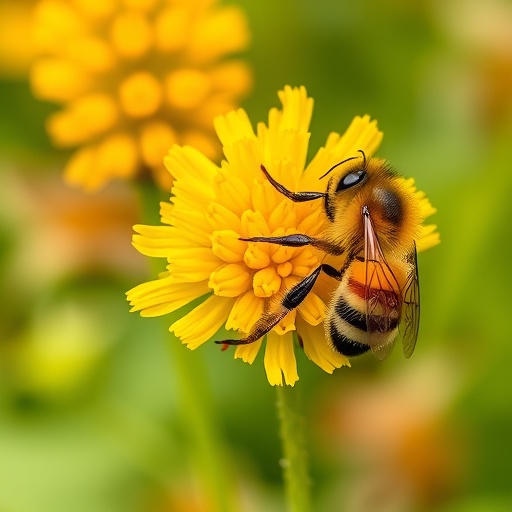In a groundbreaking study published in the renowned journal Scientific Reports, researchers Naghizadeh, Mehrabian, Maleki, and their team have unveiled significant insights into the botanical origins, chemical composition, and microbiological quality of bee pollen collected from various regions in Iran. This comprehensive investigation sheds light on the multifaceted nature of bee pollen, which is increasingly recognized as a functional food with numerous health benefits.
Bee pollen, a natural substance produced by flowering plants, is collected by bees and is known for its rich composition of nutrients, vitamins, minerals, antioxidants, and various phytochemicals. The study begins by delving into the diverse botanical origins of the pollen samples which were obtained from different Iranian regions. Each sample reflects the unique flora of its source, thus influencing the nutritional profile and medicinal properties of the pollen.
Researchers utilized advanced methodologies to identify the specific botanical species contributing to the pollen samples. Through techniques like chromatographic analysis and genetic sequencing, they were able to trace the origins back to specific plant species. It was discovered that the regional biodiversity profoundly impacts the chemical composition, leading to variations in the nutritional content of pollen. This highlights the importance of geographic and climatic conditions in defining the quality of bee pollen.
The chemical composition of the bee pollen samples analyzed in the study revealed a plethora of bioactive compounds. Comprehensive analysis demonstrated high levels of proteins, amino acids, lipids, carbohydrates, and vitamins. The presence of flavonoids, phenolic acids, and other antioxidants was particularly noteworthy. These compounds are known for their ability to combat oxidative stress, suggesting that bee pollen could be a valuable supplement in promoting overall health and well-being.
One of the key findings in the study was the microbiological quality of the bee pollen samples. The researchers meticulously assessed the pollen for microbial contamination, employing rigorous testing protocols. The results showed that while most samples had an acceptable level of microbial loads, some samples exhibited higher levels of undesirable microorganisms. This raises important questions regarding the harvesting and processing practices of bee pollen and underscores the necessity for ensuring quality control standards in the industry.
Furthermore, the study contextualizes the consumption of bee pollen within traditional Iranian medicine. The rich history of the therapeutic use of bee products in Iran highlights the cultural significance of pollen. Historically, it has been utilized to treat a range of ailments, and with the modern scientific backing presented in this research, there is potential for bee pollen to be incorporated into contemporary dietary regimens.
As global interest in natural health products continues to rise, bee pollen emerges as a contender for a healthful dietary supplement. The implications of this study could be far-reaching, paving the way for future research aimed at understanding the specific health benefits attributed to the varied chemical profiles of bee pollen sourced from different botanical origins.
Moreover, the researchers advocate for the establishment of standardized protocols that would ensure the quality and safety of bee pollen products entering the marketplace. This could potentially empower consumers to make more informed choices regarding their health and wellness.
The team also highlights the importance of sustainable practices in beekeeping and the ecological implications of pollen collection. With environmental challenges threatening bee populations, maintaining biodiversity and promoting sustainable agricultural practices are crucial for the ongoing production of bee pollen. This study serves as a reminder of the interconnectedness of natural ecosystems and human health.
In conclusion, Naghizadeh and colleagues provide compelling evidence that bee pollen is not merely a dietary supplement, but a valuable resource with significant health benefits rooted in its diverse botanical origins. The research opens up new avenues for exploration, emphasizing the need for further investigation into the specific health claims associated with bee pollen and the standardization of its production and quality assurance.
The findings hold promise not only for consumers looking to enhance their health through natural products but also for researchers and practitioners aiming to promote the broader understanding of functional foods. As this study illustrates, the humble bee pollen holds remarkable potential, both as a healthful dietary ingredient and as a subject of ongoing scientific inquiry.
The real challenge moving forward will be translating these findings into practical applications that benefit both consumers and the environment, ensuring that the integrity of bee pollen is maintained while optimizing its health benefits.
Subject of Research: The botanical origin, chemical composition, and microbiological quality of bee pollen from Iran.
Article Title: Botanical origin, chemical composition, and microbiological quality of bee pollen from Iran.
Article References:
Naghizadeh, S., Mehrabian, A., Maleki, H. et al. Botanical origin, chemical composition, and microbiological quality of bee pollen from Iran.
Sci Rep (2025). https://doi.org/10.1038/s41598-025-28500-w
Image Credits: AI Generated
DOI: 10.1038/s41598-025-28500-w
Keywords: bee pollen, chemical composition, microbiological quality, botanical origin, health benefits, Iran, functional food, dietary supplement.




